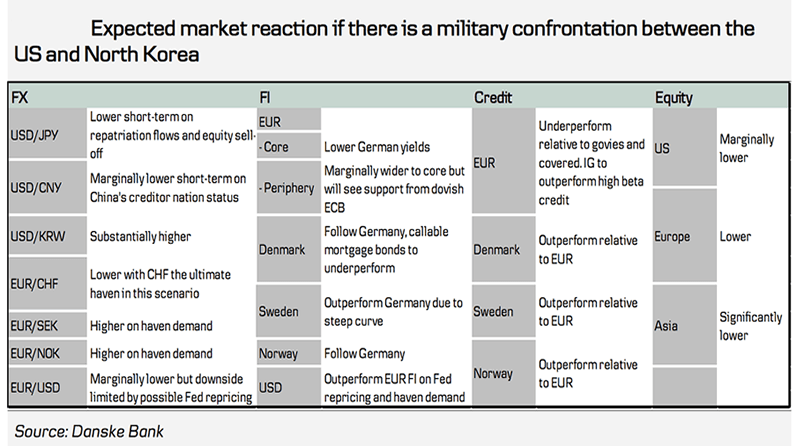Gold Price’s Korean-Inspired Rally Forecast to Last, But Others Warn Against Getting too Carried Away

The recent outbreak of global uncertainty has seen gold prices and other safe-haven assets rally sharply.
This week, tensions have escalated between North Korea and the US after the United Nations Security Council last weekend hit Pyongyang with new sanctions as punishment for North Korea’s aggressive missile testing programme.
This prompted aggressive comments from North Korea but it was the counter-response from US President Trump on Tuesday in which he employed North-Korea-Style rhetoric which caught investor attention.
The response by North Korea upped the ante - Pyongyang threatened to send a batch of missiles towards the US territory of Guam in the pacific.
And, on the afternoon of Friday, August 11 we hear Trump say a military solution might be sought to deal with North Korea.
The VIX index, which indicates how investors value market risks, has jumped towards 16 after hitting its all-time low below 10 last week.
In case you missed it: Fear index VIX surged 44% in Thur session to 16.04, the highest level so far of Trump’s presidency. pic.twitter.com/UHBXWrLdMg
— Holger Zschaepitz (@Schuldensuehner) August 11, 2017
This sparked rally in gold prices, “and we think its climb will continue above the $1,300 per ounce mark. In early July the yellow metal was nearly down to $1,200, as geopolitics carried on calmly. But now things have changed,” says Arnaud Masset, an analyst with Swissquote Bank.
The Pure Gold Company has seen a 149% increase physical gold sales this week as the war of words between North Korea and the USA galvanises first time buyers and finance professionals to protect their wealth.
Pure Gold Company CEO Josh Saul said: “First time buying has increased 76% this week, and many say the source of funds for their gold investment is coming from low interest savings accounts and ISA funds. Fear and uncertainty within politics, international relations and national security are provoking the financial markets and people are unsure how this could affect their wealth. It’s the unpredictability that our clients are most anxious about, so they are looking for a safe place for their assets.”
Japan’s Yen is another winner with USD/JPY dropping from the 111 region right down to the 109’s we are presently seeing.
“Although Japan is close to the epicentre of the crisis, the JPY typically strengthens during North Korean tensions as Japan is a creditor nation and local investors typically ‘bring money home’ when they face a crisis,” explains Thomas Harr, Global Head of FICC Research at Danske Bank.
However, investors buying into the risk-off trend might be disappointed if the risk-off run comes to an end.
Harr says investors shouldn’t “get carried away by North Korean market volatility.”
It is Danske Bank’s base-case stance that the North Korean situation will not escalate into a military confrontation, “we would expect the current risk aversion to be temporary,” says Harr.
However, Harr adds that he is not ruling an escalation of tensions out:
“Where the current tensions escalate sharply, we would expect an acceleration of this week’s price action, i.e. a sharp rise in risk premiums across asset classes, substantial falls in US and German government bonds yields, significant JPY and CHF strength and a massive sell-off in equities, particularly in Europe which is more linked into the global cycle.”
Looking ahead, North Korea’s warning that it might fire test missiles towards Guam could be launched as soon as next week.




